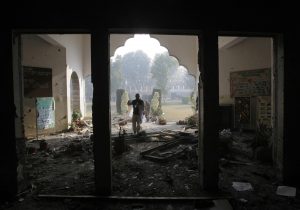The leader of the Tehreek-e-Taliban Pakistan (TTP), Noor Wali Mehsud, said in a recent interview with CNN that his group will continue its “war against Pakistan’s security forces” and its goal is to “take control of the border regions and make them independent.” In his interview, Mehsud also admitted that his group has a good relationship with the Afghan Taliban and hopes to benefit from their victories across the border.
The interview is significant as it gives an insight into the Pakistani Taliban’s political intentions and military aims in the coming months and years.
This is the first time that the TTP’s leadership has called for an independent state in Pakistan’s tribal areas.
In the past, the group focused on propagating the implementation of Sharia law across Pakistan and elsewhere. The new message it sent via the CNN interview shows that the group is not only working on redefining its ideological objectives, but also may be reviewing its ties with other militant groups.
Ideologically, TTP has been considered closer to al-Qaida as the group followed the idea of implementing the caliphate system – something which was often highlighted in TTP communications in the past. However, this may have changed as the TTP is not adhering to al-Qaida’s line anymore.
The TTP appears to be trying to draw on its own local and nationalistic identity, one that could resonate with Pashtun tribal residents, and transform the militant group into an uprising.
According to Mohammed Amir Rana, a Pakistan based security, “Although there does not exist any demand for an independent state in the tribal or merged districts, the TTP may have started believing that a nationalist rhetoric can boost its lost legitimacy among the tribes.” Additionally, the TTP may have also “learned from the Pashtun Tahaffuz Movement that a nationalist agenda can make it popular among the masses, even though it cannot transform itself into a rights-based movement.”
It is possible that the TTP is drawing inspiration from the Afghan Taliban’s strategy of keeping its goals local in order to win the support of tribal groups.
In his interview, Mehsud noted that “according to the teaching of Islam, the victory of one Muslim is necessarily helpful for the other Muslim. But how the victory of Afghan Taliban will prove helpful for the Pakistani Taliban, time will tell.” The TTP seems to be hoping for some sort of help from the Afghan Taliban to establish an independent state in tribal areas.
Arguably, the TTP’s new leadership may have realized that the border dispute between Pakistan and Afghanistan remains an issue that resonates with Pashtuns on both sides of the Durand Line, including the Afghan Taliban. It is important to note here that the Afghan Taliban has refused to recognize the Durand Line as a settled border between Afghanistan and Pakistan despite pressure from Islamabad.
This essentially means that the Afghan Taliban are not likely to recognize the border in the coming months and years, as this may not be acceptable to the group’s support base among Pashtun communities in Afghanistan and perhaps, in Pakistan’s tribal regions.
In this context, the TTP may have concluded that the idea of an independent state in tribal areas would resonate with the Afghan Taliban and Pashtun tribes on the Pakistani side adding to its own popularity.
To an extent, this means that the TTP is trying to make space for itself in a dispute that has remained Pakistan’s core security concern vis-à-vis Afghanistan. It is not a surprise then that Pakistan views the TTP and the Afghan Taliban as ideological twins and is actively rejecting the idea of the Afghan Taliban capturing power in Kabul through military force.
In his interview, Mehsud described Pakistan’s security agencies as the enemy. He did not talk about carrying out attacks against civilians.
This is a major change in the TTP’s strategy and seems aimed at winning the support of local communities.
It may be recalled that during the 2007-2014 period, the TTP had killed civilians indiscriminately and was reviled for this across Pakistan.
However, recent attacks have been mainly focused on Pakistan’s security agencies and restricted to Pakistan’s tribal areas, particularly North and South Waziristan. Since May, the TTP has been involved in more than 100 attacks in Khyber Pakhtunkhwa (KP) and Baluchistan. Almost all of these attacks targeted Pakistan’s security agencies.
In a nutshell, Mehsud’s interview makes it clear that the TTP is not only prepared to militarily confront Pakistan but also, it has a support base spread across the Durand Line and will attempt to win the support of local tribes.
Meanwhile, across the border in Afghanistan, the Taliban is making rapid territorial gains that seem aimed at capturing power in Kabul by force. This doesn’t bode well for Pakistan’s security and territorial integrity.
Pakistan has tough days ahead.

































